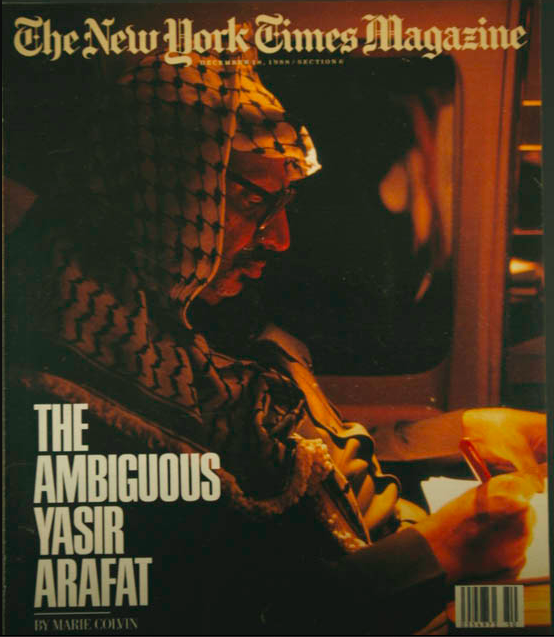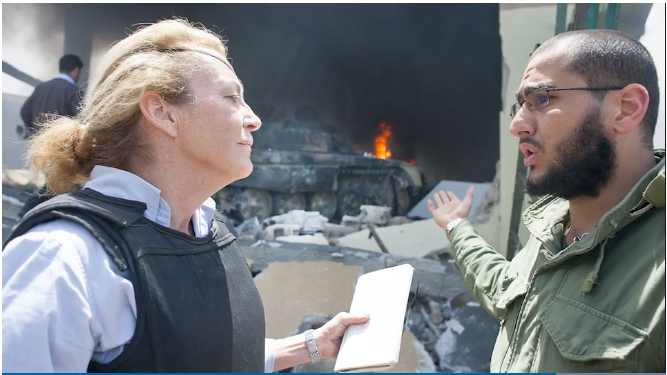Marie’s Story
Marie was born in Astoria, Queens and raised in Oyster Bay, New York. Her parents, William and Rosemarie were both high school teachers, and Marie was the oldest of five children. Shortly after her graduation from Yale in 1978, Marie started her career as editor of the newsletter for the the Teamsters Local 237 in New York City.
Marie in 2010.
She soon began writing as a staff reporter for United Press International in Trenton, covering local news. By 1984, UPI had named her Paris Bureau Chief, heading up the international news desk. This position provided Marie with her first opportunity to cover the Middle East, and she soon became fascinated by the region's culture, politics and conflicts.
In 1986, she moved to the Sunday Times of London. For the next 26 years, she covered conflicts wherever they broke out, including East Timor, the Balkans, Chechnya, Kosovo, Zimbabwe, Sierra Leone and Somalia, but she was known especially for her reporting from the Middle East. Marie was on hand to witness events in the Middle East from the Iran-Iraq War in the late 1980’s, through two US wars with Iraq, and ultimately the 2011 revolutions in Tunisia, Egypt, Libya and Syria.
Marie with Yasser Arafat in 1988
Marie interviewed and met with heads of state and military leaders in many countries, but she most often wrote about the devastating impact of war on the civilian population. “These are people who have no voice,” she said. “I feel I have a moral responsibility towards them, that it would be cowardly to ignore them. If journalists have a chance to save their lives, they should do so.” In 1999, in East Timor, Marie got that chance.
She was credited with saving the lives of 1,500 women and children who were trapped in a United Nations compound by Indonesian-backed forces. She refused to leave them when UN staff and journalists were evacuated, and continued to send news out of the compound, highlighting the plight of the refugees to the world. Embarrassed by Marie's powerful reports, the U.N. reversed its decision to leave the innocent behind, and evacuated them to safety.
Marie put enormous physical and creative effort into her work. On many occasions, she faced extreme physical hardship to cover a story. In Sri Lanka in 2001 she had walked for days through the jungle with local guides to evade government troops, when the group came under attack. Marie was struck by shrapnel from a rocket-propelled grenade, which resulted in the loss of her left eye.
Marie in the hospital after being hit by a strike in Sri Lanka.
Despite suffering such grave injuries, Marie filed her story on time from her hospital bed, and returned to the front line as soon as she recovered. She wore a black eye-patch from then on, which became her trademark and her badge of honor.
In February 2012, Marie crossed into Syria, ignoring the Syrian government's attempts to prevent foreign journalists from covering the Syrian civil war. She made her way to the city of Homs which was being bombarded by the Syrian Army.
In an interview broadcast on CNN the night before her death, Marie described the merciless shelling and sniper attacks against civilians as the worst conflict she had ever experienced. “It’s a complete and utter lie they’re only going after terrorists. The Syrian Army is simply shelling a city of cold, starving civilians.”
She was one of few western journalists inside Syria, and deeply believed that her presence provided a vital line of information to the outside world. In one of the final messages Marie sent to her editor before her death, she wrote, "Will keep trying to get out the information."
Marie was killed when the makeshift media center where she and several other journalists were staying was bombed by Syrian rocket fire. The attack also killed acclaimed French photographer, Rémi Ochlik, and injured British photographer Paul Conroy, Syrian translator Wael al-Omar, and French journalist Edith Bouvier.
Her death sparked a massive outpouring of tributes by heads of state, colleagues, admirers and victims of war around the world. In her home town of Oyster Bay, the streets were draped in flags, and hundreds of people came to mourn her death and to recognize her life’s accomplishments.
Marie herself best explained her reason for covering wars. “My job is to bear witness. I have never been interested in knowing what make of plane had just bombed a village.” She wrote about people suffering the effects of war so that others might understand the truth and take action to promote peace and compassion.













